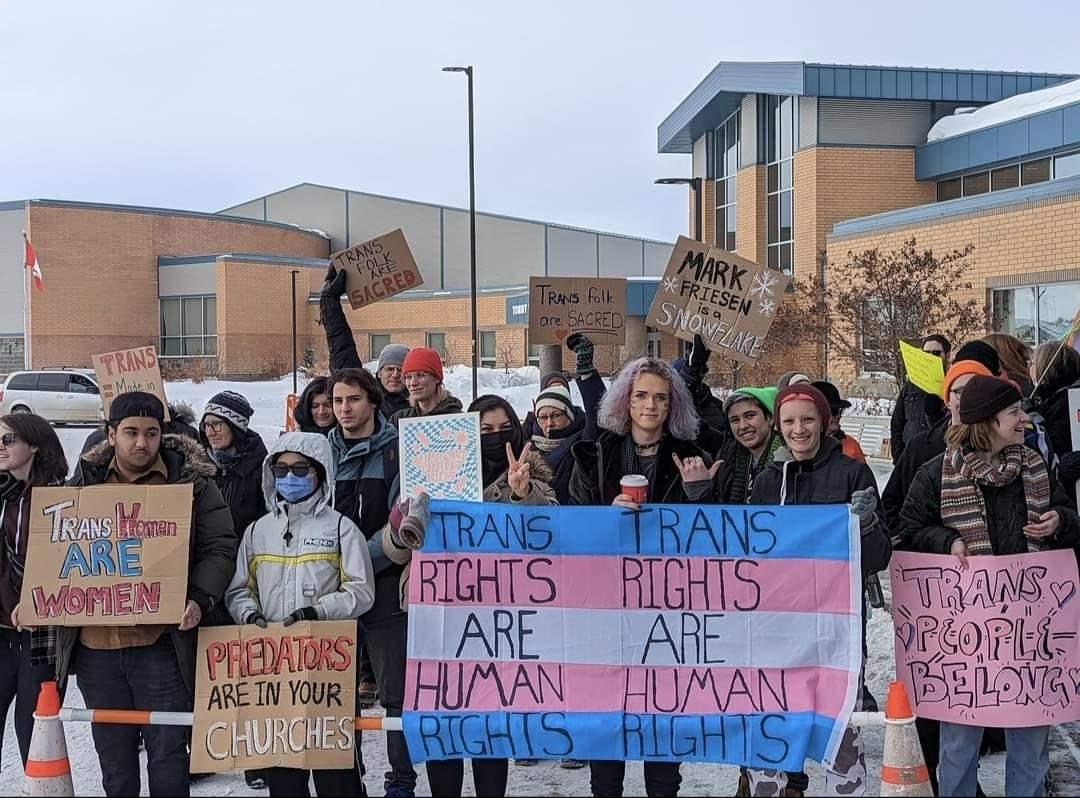A look into the counter-protests that have been occuring at the Shaw Center, specifically focusing on the Feb. 4 counter-protest.
The following article contains potentially triggering discourse surrounding transphobia and a notably transphobic figure.
On Feb. 4, 2023, a protest broke out at the Saskatoon Shaw Center. Organized by Mark Friesen, an infamous and recurring character within the topic of gender politics in Saskatchewan, the protest’s aim was to stop trans women from using the change rooms that match closest with their gender identity. The protest was sparked after a trans woman used the woman’s changing room after using the Shaw Center’s facilities.
Saskatoon’s queer community responded quickly to this issue by organizing a counter-protest. On Feb. 1, Blake Tait (he/him/his), a local drag king by the name of Ford Ranjer, made a post on his Instagram calling for Saskatoon’s queer and ally community to join him in a counter-protest, to which he received plenty of positive feedback and support.
When asked about the goal of this counter-protest, Tait stated that “My main goal was to show that in the face of hate, our community will always show up, and that our love and care for each other will outlast their transphobia.” He continued by declaring that “drag was built on protest and that legacy should be honored.”
On his social media, Friesen stated “I say we keep up the pressure every weekend at the Shaw Center.” In response to this, Tait said that, “I’ll be out as long as they’re out, every weekend.”
When asked about when (and if) the protest ended, Laila Valila (she/he/they), a second-year political science and gender fluid student at USask, said that “the protest did not end” since “this sort of protest will never end considering how limited/unacknowledged the rights of transgender people around the globe are.”
Aurora Rieder (they/she/he), a first year psychology student at USask, stated that the protest’s goal was to “keep trans people out of their preferred gender washrooms, stating that they need to protect their kids, making them ignorant in their ongoing beliefs that trans people are predators.”
Rieder attended the counter-protest on Feb 4. In light of their experience, they said that “The amount of trans, queer and allies at the protest made it feel like it was such a safe space and that you’re not alone in fighting for what you believe in. There were people of any age, older, younger, it didn’t matter because they all knew and supported the 2SLGBTQ+ community, showing that it isn’t hard to learn to accept the queer community no matter the generation you were born in.”
The goal of the counter-protest was generally to show the protesters that hate will be met with love. However, when questioned about the effectiveness of the counter-protest, Rieder wondered about how it can enact change: “Changing people’s minds about something that they are incredibly against takes more than a protest. We need to educate and respond to them.”
Whether or not the counter-protest was able to change minds or educate, it certainly worked well in generating solidarity and conversation. Rieder expressed their feelings of connection and comfort in the community. Tait echoed these feelings, saying, “Despite the transphobic language being spit at us, we had a good time, there was laughing and smiling on our side the whole time.”
On Sep. 30, 1975, the Sheaf published an advertisement for the creation of a gay group on campus. Doug Wilson, the writer of this advertisement, faced academic and social backlash as a result of this call for community. This was nearly fifty years ago — and today we continue to see backlash towards queer students and people all around our city. While these protests do not directly affect campus, it does directly affect a portion of the students on campus due to the continuous local hate. There is an ongoing demand for progress, one that can start in small communities and make its way into everyone’s quotidian lives.
Tait asks that Saskatoon’s queer allies “learn and understand why we are scared and what we are fighting to hold on to” and “if you can make it out to a protest, please do.” Valila says that “doing micro acts such as asking/providing pronouns” is a great way to begin generating better widespread acceptance and awareness on campus.

Leave a Reply